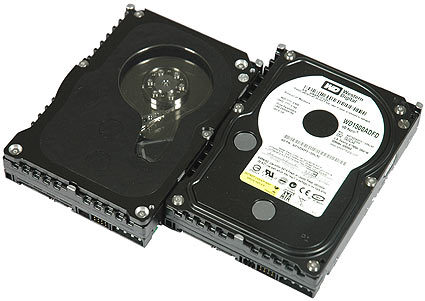WD1500AD Raptor X-Tends Performance Lead
Conclusion: The Raptor-X Is Unrivaled
Finally, we have a new high-performance enthusiast hard drive that is capable of beating its competition in the blink of an eye. Of course it's the high rotation speed of 10,000 RPM that lets the Raptor perform noticeably better than any 7,200 RPM drive in everyday uses. This applies to both access time and data transfer performance, and it helps to further reduce the annoying little delays inherent in everyday PC operation.
The Raptor-X's performance is even good enough to beat a RAID 0 array consisting of two modern 7,200 RPM drives, except in terms of pure throughput, of course. In addition, it is nicer having only one drive to install, and the data safety of a single drive is better anyway. Speaking of safety, we should refer to the five year warranty, which should give you a good feeling.
So is the Raptor-X the perfect show stopper for the competition? Yes, it is, but not only because it's better than its rivals in the enthusiast market space. Generally we would always recommend the fastest drive available as a system drive, although we believe that $350 is a bit over the top. (The fact that you will save $50 by simply doing without the clear cover should be also taken into account.)
The reason why the Raptor-X actually is unrivaled is the total lack of competition in this high performance desktop space. Seagate may have some potential due to the recent acquisition of Maxtor, but the current Barracuda 7200.8 and 7200.9, as well as the Maxtor portfolio, simply aren't good enough for users with the highest performance ambitions. That's especially the case since the new Raptor is considerably faster than its predecessors. It's time for Hitachi, Maxtor/Seagate and Samsung to get moving.
Get Tom's Hardware's best news and in-depth reviews, straight to your inbox.
Current page: Conclusion: The Raptor-X Is Unrivaled
Prev Page SYSmark 2004 SE Application Benchmark
Patrick Schmid was the editor-in-chief for Tom's Hardware from 2005 to 2006. He wrote numerous articles on a wide range of hardware topics, including storage, CPUs, and system builds.
-
MacSH Two 7200 rpm drives in raid0? Bah, I'll take my two raptors in a raid0 any day ... Holy lack of bottlenecks, Batman!Reply
